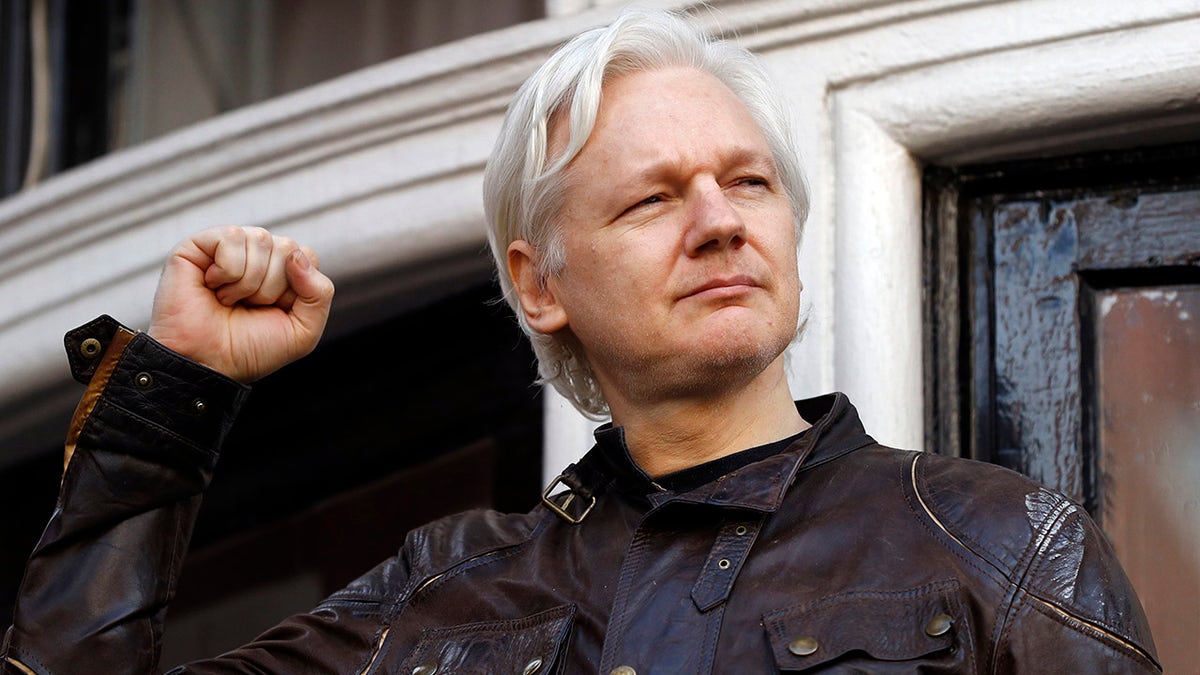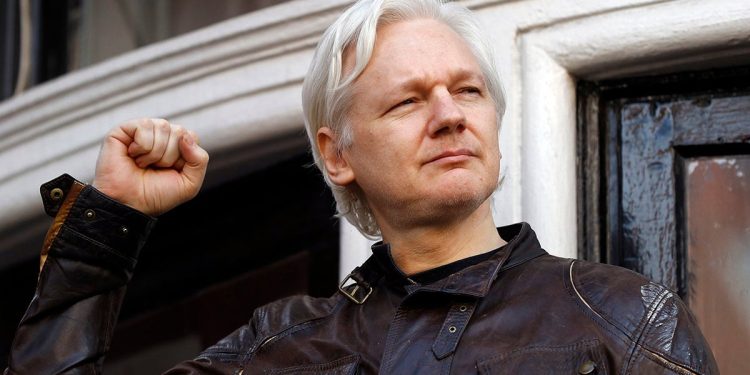
A United Nations expert on torture is calling on the U.K. government to halt the possible extradition of Wikileaks founder Julian Assange to the U.S., citing concerns that he would be at risk of treatment amounting to torture or other forms of ill-treatment or punishment.
The U.N. Special Rapporteur on Torture, Alice Jill Edwards, said in a press release that Assange ‘suffers from a long-standing and recurrent depressive disorder’ and that he ‘is assessed as being at risk of committing suicide.’
The hearing for Assange’s possible final legal appeal challenging his extradition to the U.S. to face charges for publishing classified U.S. military documents will be held at the High Court in London on Feb. 20 and 21. If he is extradited to the U.S. after exhausting all his legal appeals, Assange would face trial in Alexandria, Virginia, and could be sentenced to up to 175 years in an American maximum-security prison.
‘If extradited, he could be detained in prolonged isolation while awaiting trial, or as an inmate. If convicted, he could be sentenced to up to 175 years in prison,’ Edwards said.
Assange, 52, is facing 17 charges for allegedly receiving, possessing and communicating classified information to the public under the Espionage Act, and one charge alleging a conspiracy to commit computer intrusion.
The charges were brought by the Trump administration’s Justice Department over WikiLeaks’ 2010 publication of cables leaked by U.S. Army intelligence analyst Chelsea Manning detailing war crimes committed by the U.S. government in the Guantánamo Bay, Cuba, detention camp, Iraq and Afghanistan. The materials also exposed instances of the CIA engaging in torture and rendition.
WikiLeaks’ ‘Collateral Murder’ video showing the U.S. military gunning down civilians in Iraq, including two Reuters journalists, was also published 14 years ago.
‘The risk of being placed in prolonged solitary confinement, despite his precarious mental health status, and to receive a potentially disproportionate sentence raises questions as to whether Mr. Assange’s extradition to the United States would be compatible with the United Kingdom’s international human rights obligations, particularly under article 7 of the International Covenant on Civil and Political Rights, as well as respective articles 3 of the U.N. Convention against Torture and the European Convention on Human Rights,’ Edwards said.
‘Diplomatic assurances of humane treatment provided by the Government of the United States are not a sufficient guarantee to protect Mr. Assange against such risk,’ Edwards said. ‘They are not legally binding, are limited in their scope, and the person the assurances aim to protect may have no recourse if they are violated.’
Assange, an Australian journalist and publisher, has been held at London’s high-security Belmarsh Prison since he was removed from the Ecuadorian Embassy on April 11, 2019, for breaching bail conditions. He had sought asylum at the embassy since 2012 to avoid being sent to Sweden over allegations he raped two women because Sweden would not provide assurances it would protect him from extradition to the U.S. The investigations into the sexual assault allegations were eventually dropped.
Last month, a group of Australian lawmakers wrote a letter to U.K. Home Secretary James Cleverly demanding Assange’s U.S. extradition be halted over concerns about his safety and well-being. The letter asked the U.K. government to make an independent assessment of Assange’s risk of persecution.
A cross-party delegation of Australian lawmakers also visited Washington, D.C., last year and met with U.S. officials, members of Congress and civil rights groups to demand the charges against Assange be dropped. Multiple bipartisan efforts were also made last year by U.S. lawmakers who demanded Assange’s release.
Australian Prime Minister Anthony Albanese has also repeatedly called on the U.S. in the last year to end the prosecution of Assange.
No publisher had been charged under the Espionage Act until Assange, and many press freedom groups have said his prosecution sets a dangerous precedent intended to criminalize journalism. U.S. prosecutors and critics of Assange have argued WikiLeaks’ publication of classified material put the lives of U.S. allies at risk, but there is no evidence that anyone was put in danger as a result of the documents being published.
The editors and publishers of the U.S. and European outlets that worked with Assange on the publication of excerpts from more than 250,000 documents he obtained in the Cablegate leak — The Guardian, The New York Times, Le Monde, Der Spiegel and El País — wrote an open letter in 2022 calling for the U.S. to drop the charges against Assange.
The Obama administration elected not to indict Assange in 2013 over WikiLeaks’ 2010 publication of the classified cables because it would have had to also indict journalists from major news outlets who published the same materials. Former President Obama also commuted Manning’s 35-year sentence for violations of the Espionage Act and other offenses to seven years in January 2017, and Manning, who had been imprisoned since 2010, was released later that year.
But the Justice Department under former President Trump later moved to indict Assange under the Espionage Act, and the Biden administration has continued to pursue his prosecution.
‘I call on the Government of the United Kingdom to carefully review Mr. Assange’s extradition order with a view to ensuring full compliance with the absolute and non-derogable prohibition of refoulement to torture and other cruel, inhuman or degrading treatment or punishment and to take all the necessary measures to safeguard Mr. Assange’s physical and mental health,’ Edwards said.
Assange’s lawyer in the U.K., Jennifer Robinson, has previously said she fears he ‘would not survive if extradited to the U.S.’
Under the Trump administration, the CIA allegedly had plans to kill Assange over the publication of sensitive agency hacking tools known as ‘Vault 7,’ which were leaked to Wikileaks, Yahoo reported in 2021. The agency said the leak represented ‘the largest data loss in CIA history.’
The CIA was accused of having discussions ‘at the highest levels’ of the administration about plans to assassinate Assange in London and allegedly followed orders from then-CIA director Mike Pompeo to draw up kill ‘sketches’ and ‘options.’ The agency also had advanced plans to kidnap and rendition Assange and had made a political decision to charge him, according to the Yahoo report.
WikiLeaks also published internal communications in 2016 between the Democratic National Committee and presidential candidate Hillary Clinton’s campaign that revealed the DNC’s attempts to boost Clinton in that year’s Democratic primary.

A United Nations expert on torture is calling on the U.K. government to halt the possible extradition of Wikileaks founder Julian Assange to the U.S., citing concerns that he would be at risk of treatment amounting to torture or other forms of ill-treatment or punishment.
The U.N. Special Rapporteur on Torture, Alice Jill Edwards, said in a press release that Assange ‘suffers from a long-standing and recurrent depressive disorder’ and that he ‘is assessed as being at risk of committing suicide.’
The hearing for Assange’s possible final legal appeal challenging his extradition to the U.S. to face charges for publishing classified U.S. military documents will be held at the High Court in London on Feb. 20 and 21. If he is extradited to the U.S. after exhausting all his legal appeals, Assange would face trial in Alexandria, Virginia, and could be sentenced to up to 175 years in an American maximum-security prison.
‘If extradited, he could be detained in prolonged isolation while awaiting trial, or as an inmate. If convicted, he could be sentenced to up to 175 years in prison,’ Edwards said.
Assange, 52, is facing 17 charges for allegedly receiving, possessing and communicating classified information to the public under the Espionage Act, and one charge alleging a conspiracy to commit computer intrusion.
The charges were brought by the Trump administration’s Justice Department over WikiLeaks’ 2010 publication of cables leaked by U.S. Army intelligence analyst Chelsea Manning detailing war crimes committed by the U.S. government in the Guantánamo Bay, Cuba, detention camp, Iraq and Afghanistan. The materials also exposed instances of the CIA engaging in torture and rendition.
WikiLeaks’ ‘Collateral Murder’ video showing the U.S. military gunning down civilians in Iraq, including two Reuters journalists, was also published 14 years ago.
‘The risk of being placed in prolonged solitary confinement, despite his precarious mental health status, and to receive a potentially disproportionate sentence raises questions as to whether Mr. Assange’s extradition to the United States would be compatible with the United Kingdom’s international human rights obligations, particularly under article 7 of the International Covenant on Civil and Political Rights, as well as respective articles 3 of the U.N. Convention against Torture and the European Convention on Human Rights,’ Edwards said.
‘Diplomatic assurances of humane treatment provided by the Government of the United States are not a sufficient guarantee to protect Mr. Assange against such risk,’ Edwards said. ‘They are not legally binding, are limited in their scope, and the person the assurances aim to protect may have no recourse if they are violated.’
Assange, an Australian journalist and publisher, has been held at London’s high-security Belmarsh Prison since he was removed from the Ecuadorian Embassy on April 11, 2019, for breaching bail conditions. He had sought asylum at the embassy since 2012 to avoid being sent to Sweden over allegations he raped two women because Sweden would not provide assurances it would protect him from extradition to the U.S. The investigations into the sexual assault allegations were eventually dropped.
Last month, a group of Australian lawmakers wrote a letter to U.K. Home Secretary James Cleverly demanding Assange’s U.S. extradition be halted over concerns about his safety and well-being. The letter asked the U.K. government to make an independent assessment of Assange’s risk of persecution.
A cross-party delegation of Australian lawmakers also visited Washington, D.C., last year and met with U.S. officials, members of Congress and civil rights groups to demand the charges against Assange be dropped. Multiple bipartisan efforts were also made last year by U.S. lawmakers who demanded Assange’s release.
Australian Prime Minister Anthony Albanese has also repeatedly called on the U.S. in the last year to end the prosecution of Assange.
No publisher had been charged under the Espionage Act until Assange, and many press freedom groups have said his prosecution sets a dangerous precedent intended to criminalize journalism. U.S. prosecutors and critics of Assange have argued WikiLeaks’ publication of classified material put the lives of U.S. allies at risk, but there is no evidence that anyone was put in danger as a result of the documents being published.
The editors and publishers of the U.S. and European outlets that worked with Assange on the publication of excerpts from more than 250,000 documents he obtained in the Cablegate leak — The Guardian, The New York Times, Le Monde, Der Spiegel and El País — wrote an open letter in 2022 calling for the U.S. to drop the charges against Assange.
The Obama administration elected not to indict Assange in 2013 over WikiLeaks’ 2010 publication of the classified cables because it would have had to also indict journalists from major news outlets who published the same materials. Former President Obama also commuted Manning’s 35-year sentence for violations of the Espionage Act and other offenses to seven years in January 2017, and Manning, who had been imprisoned since 2010, was released later that year.
But the Justice Department under former President Trump later moved to indict Assange under the Espionage Act, and the Biden administration has continued to pursue his prosecution.
‘I call on the Government of the United Kingdom to carefully review Mr. Assange’s extradition order with a view to ensuring full compliance with the absolute and non-derogable prohibition of refoulement to torture and other cruel, inhuman or degrading treatment or punishment and to take all the necessary measures to safeguard Mr. Assange’s physical and mental health,’ Edwards said.
Assange’s lawyer in the U.K., Jennifer Robinson, has previously said she fears he ‘would not survive if extradited to the U.S.’
Under the Trump administration, the CIA allegedly had plans to kill Assange over the publication of sensitive agency hacking tools known as ‘Vault 7,’ which were leaked to Wikileaks, Yahoo reported in 2021. The agency said the leak represented ‘the largest data loss in CIA history.’
The CIA was accused of having discussions ‘at the highest levels’ of the administration about plans to assassinate Assange in London and allegedly followed orders from then-CIA director Mike Pompeo to draw up kill ‘sketches’ and ‘options.’ The agency also had advanced plans to kidnap and rendition Assange and had made a political decision to charge him, according to the Yahoo report.
WikiLeaks also published internal communications in 2016 between the Democratic National Committee and presidential candidate Hillary Clinton’s campaign that revealed the DNC’s attempts to boost Clinton in that year’s Democratic primary.
















